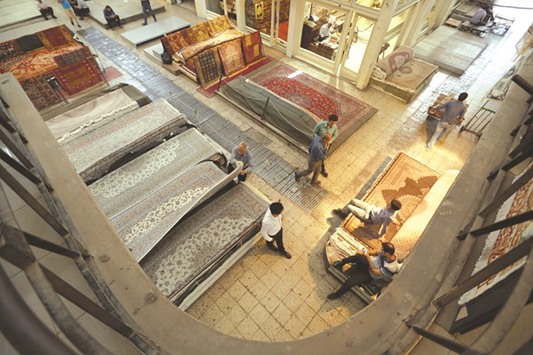As a tailor in Tehran’s fabled Grand Bazaar for over 60 years, Mostafa Javedan has lived through coups, wars, a revolution – and now the ups and downs of international sanctions.
His little store in the shade of the bazaar’s high stone arches, established by his grandfather in the days of the 19th century Qajar dynasty, has weathered all these storms and remained firmly tied to global trends even when Iran was at its most isolated.
“The chicest and the best-dressed in the world are the French and then it’s the Iranians, but the English produced the best fabrics,” the 80-year-old said, looking snappy in a pair of shades and blue slacks.
Times have changed, however.
These days, Mostafa sits back and lets his son Saeed do the work, and most of the fabrics come from China – one effect of the international sanctions slapped on Iran in 2012 over its nuclear programme.
“The Europeans pushed us toward China. Ten years ago we never bought fabrics from China, but their quality has been improving,” said Saeed.
“I think sanctions were a boost for the Chinese economy.”
The bazaar is still the main centre for business in Tehran, packed with shoppers browsing everything from centuries-old carpets to the latest mobile phones.
When Iran’s nuclear deal with world powers struck in July 2015 led to many of the sanctions being lifted in January, small family-run stores in general saw little obvious change.
They had already been forced to adapt, and in keeping with Iran’s long history as a central point of East-West trade, many of its merchants had simply shifted their focus towards Asia.
In one of the many kitchenware stores, most of the pots and pans are marked “Made in China”.
“We have some goods from Italy and the United States, but very few,” said Ali Masoumi, 30, whose father set up shop in the 1950s.
He said the real changes had to come from within, and was sceptical the nuclear deal would make much difference.
“If there is going to be any change it must be from inside Iran. The government should have a will for change. That will doesn’t exist,” he said.
The moderate government of President Hassan Rouhani that came to power in 2013 has stabilised the runaway inflation and currency collapse of previous years.
Rouhani hopes the end of sanctions will help Iran attract $30 to $50bn in annual investment needed to hit his target of 8% growth.
But a raft of US sanctions are still in place, related to Iran’s human rights record and missile testing, leaving shoppers as well as businesses cautious.
“People still don’t want to risk investing and spending. They want to be sure there won’t be any more drastic changes in the dollar rate, banking, housing and everything else,” said Masoumi.
Still, others say the positive atmosphere created by the nuclear deal is already paying dividends.
Iranians shop in Tehran’s ancient Grand Bazaar. A year ago, a landmark nuclear deal with world powers led jubilant Iranians to dream of an end to isolation and economic hardship, but critics say US obstacles have soured those hopes. Despite many sanctions being lifted, the international banking system is still too nervous to work with Iran.

Iranians shop in Tehran’s ancient Grand Bazaar. A year ago, a landmark nuclear deal with world powers led jubilant Iranians to dream of an end to isolation and economic hardship, but critics say US obstacles have soured those hopes. Despite many sanctions being lifted, the international banking system is still too nervous to work with Iran.
